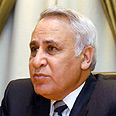
Settlers: Willing to leave now
West Bank settlers concerned over the prospects of another disengagement, say they are willing to leave settlements now, if duly compensated. 'This used to be a part of Israel,' one settler told President Katzav in a meeting Thursday, 'but now we need to look at reality clearly'
The Israeli residents of the West Bank are beginning to realize that a further disengagement may be on the horizon, and that their own future may be at risk.
The Judea and Samaria settlers are now demanding that compensations and alternative housing be offered to them presently, so that they can prepare for such a scenario beforehand.
The settlers met with President Moshe Katzav Thursday in his residence, for a meeting that was set up by the "One Home" organization. "
One Home calls on the government to assist West Bank settlers who live outside the settlements blocs and the perimeters of the security fence to move back into the Green Line boundries, by granting them financial aid.
The organization was established on the eve of the disengagement by centre and left-wing public figures, who intend to propose a bill to the government, to ensure the financial future of the West Bank's settlers.
Avoiding the trauma of the next disengagement
"It is inconceivable that we wake up one day and find ourselves outside the security fence. I am an Israeli citizen, I pay taxes, I did army service, but today I feel like a refugee, exposed to Palestinian terror," Benny Raz, a 51 years-old resident of the West bank settlement of Karney Shomron said in the meeting.
Raz moved into the community eight years ago, and he now asks that the government enable him to return into the bounds of the Green Line, by offering appropriate compensation. Raz wants to avoid the next disengagement's trauma.
'35 percent want to leave'
MK Avshalom Vilan (Meretz), one of the organization's founders who also attended the meeting, said that about 80,000 people reside in 68 communities located on the eastern side of the security fence – communities that are not included in Israel's future territory according to the Road Map. He also claims that a great part of these settlers will be willing to leave their homes if they are given the opportunity.
"In a survey we conducted on June among the West bank settlers from these communities, about 35 percent said they would be willing to evacuate immediately, if the government grants them proper compensations or alternative housing," Vilan said.
"Our aim is to find a dignified solution for these people's return to Israel," he added.
Vilan also claimed that the survey revealed 54 percent of the survey's participants do not define themselves as "settlers," and said they chose to live in the West Bank because the area offered a higher quality of life.
He added that the organization intends to conduct a similar survey in the near future, and expects to find a higher demand to leave, now that the disengagement is completed.
'The government encouraged us to come here'
"I came to Karney Shomron in search of a good quality of life," Raz told President Katzav during the meeting. "All during the years, the Israeli governments nurtured this community and encourage people to move here, so we never had a reason to fear we will not be here in the future," Raz said.
"This is a beautiful place, which used to be a part of Israel, but we need to look at reality clearly," he said.
"Just now, after the evacuation of Gush Katif, I realize that those who evacuated Gush Katif will one day come to evacuate us as well. I do not want to find IDF officers knocking at my door one day," Raz concluded.
One Home: No political implications intended
After he listened to the settlers, the president asked whether the organization's activity is not likely to diminish Israel's negotiation capacity in the talks with the Palestinian Authority.
Elik Ron, a member of the organization and former Chief of the northern police unit, replied: "We are trying to respond to a security situation that arose. People are looking for answers, and are not getting them from the government."
Another member, Alon Pinkas, said that the organization aims at bringing the matter into public discussion.
"We have no intention of interfering with the government's decision, or to bring about any political implications. We are merely trying to help people who are in distress," Pinkas explained.










